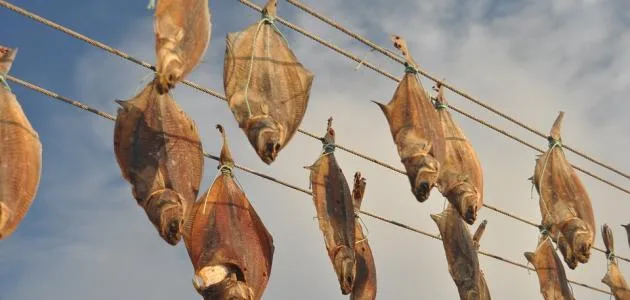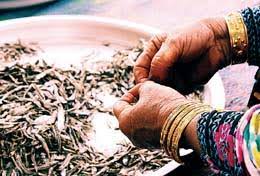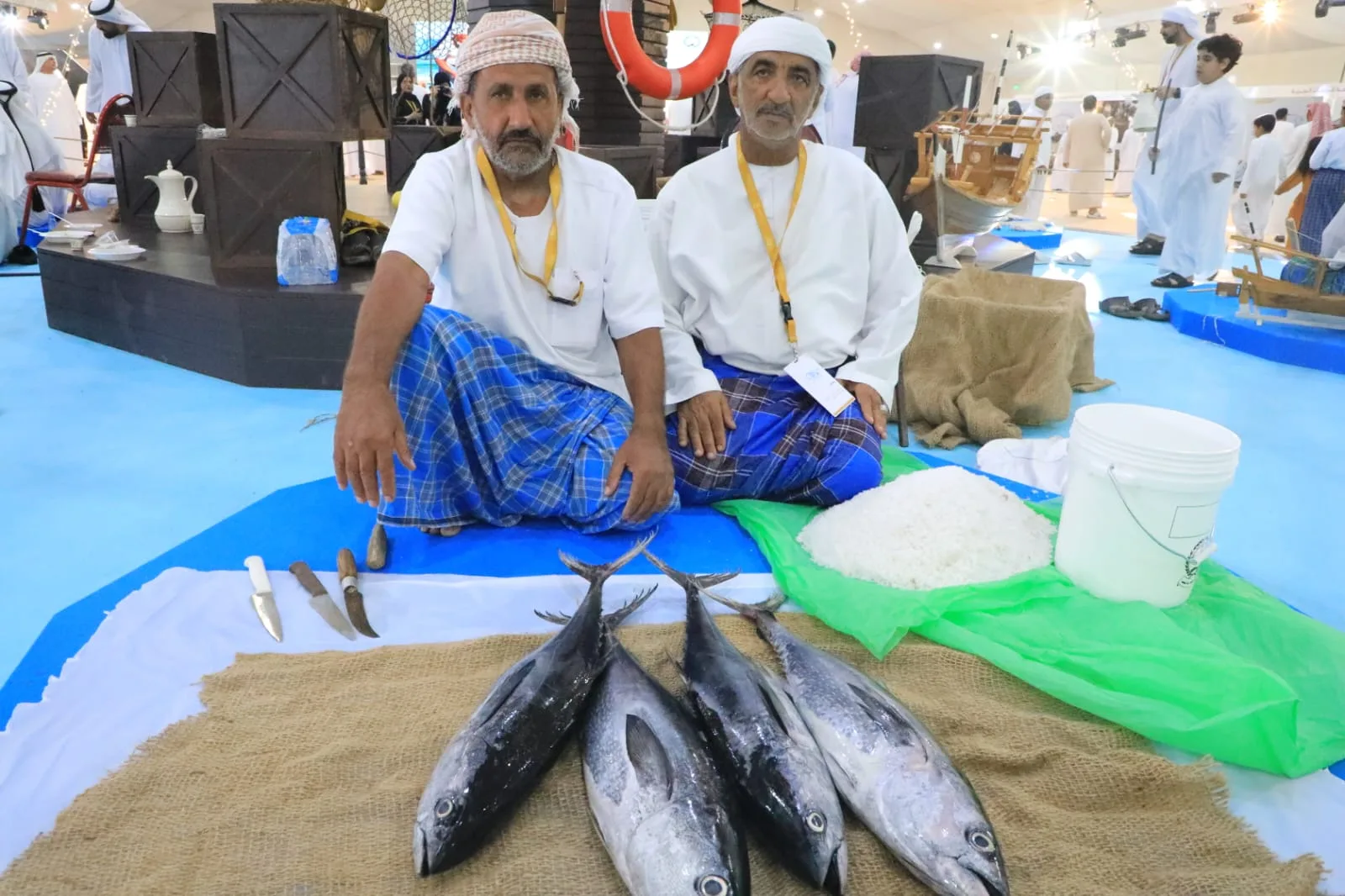United Arab Emirates
Emirate of Sharjah
Dibba Al-Hisn Municipal Council
Inventory of cultural heritage
(3) Al-ᾱuwal
“Al-ᾱuwal” dried fish, a method of fish preservation by salting and drying for food. It consists of long slices of small shark meat known as “Yaryor”. “Al-ᾱuwal” is used as a delicious traditional dish after being cooked, created by the people of Dibba Al-Hisn city on the coast of the Sea of Oman in the northeast of the Emirate of Sharjah, United Arab Emirates. It has become an important traditional dish on the UAE people table.
After catching the small sharks known as ” Yaryor ” using large quantities of “Leekh” fishing nets, fishermen have created a preservation method for such type of fish by drying to preserve them for long periods that last for more than a year in order to secure food. The preparation of “Al-ᾱuwal” goes through several stages: Starting by fishing large quantities of small shark “Yaryor” using “Leekh” fishing nets, cutting off the head and fins, cutting open the belly, removing the guts, then removing all the bones and skin, after which the fish cut into long slices, all meet at the tail, washed by water, salted by coarse salt, then hung on a rope tighten over branches of trees or wood to dry it in the air and sunlight for three days, then washed by seawater to remove the salt, then dried again in sunlight and air, the drying time ranges from one week to one month, to ensure that the slices are dried well, it must be hung spaced apart and turned over so that they are exposed to the sunlight from all sides, then packed in plastic bags, and thus ready for sale to the citizens of Dibba city and displayed in the fish market and other markets in Sharjah and other Emirates. The fishermen also produce “Al-ᾱuwal” to provide food for their families throughout the year. In the past, the “Al-ᾱuwal” producers were the ones who prepared it for sale, and their customers were mainly residents of areas far from the sea, who bought large quantities and stored them for consumption throughout the year. Refrigerators were not common at such time, and access to fish sellers was not an easy for the desert people, so obtaining and drying dried fish remained a good option for them, as “Al-ᾱuwal” is a type of fish that does not need to be kept in the refrigerator and remains edible for a long time. Fishermen were very selective about good- quality sharks, cut them into long slices, separate their heads, clean their guts thoroughly, skin them while keeping their slices connected, then salted them on all sides, and leave it for three days before being washed by sea water to remove the salt. After that, they are spread out and dried in the sunlight again, turning them over every day, and hung them on ropes until dried, the lengths and sizes of “Al-ᾱuwal” slices varied according to their cutting, as small fish are cut into squares with the sides spaced apart by a stick to increase the area exposed to the sun, while larger fish, are cut into several finger-sized pieces and exposed to sunlight, “Al-ᾱuwal” drying time varies according to their sizes and weather conditions, sometimes it may take up to one month. Usually, “Al-ᾱuwal” remain edible for one year. It is often eaten at lunch, and is one of the main foods for the long land trips.
The people of the sea took care to dry the fish well, so that it could be sold at a good price, some fishermen excelled in producing “Al-ᾱuwal” to the point that their names were enough to raise its price. Also, most of the coast women were skilled in preparing “Al-ᾱuwal” meal, drying them, then storing them for the winter days when fishing was scarce and non-existent, or send them as gifts to the relatives living in areas far from the coast. “Al-ᾱuwal” is consumed within a year of being dried and salted, as it remains edible for only one year, after which its meat color changes to brown and its taste becomes unpalatable when cooked, then it is turned into animal feed. “Al-ᾱuwal” is used to cook several dishes in the UAE cuisine, notably “Jasheed”, and some also use it to prepare “Makbbous”. In all cases, it is washed thoroughly and cooked in clean water for some time until it softens, with water changed two or more times to remove the saltiness, when preparing, the onions, crushed garlic, sweet pepper, hot pepper, spices and tomatoes are cooked in a separate pot until the vegetables is dissolved, then the “Al-ᾱuwal” cooked in the first pot are added with some water. Some people choose to add some wild thyme to improve the flavor, and leave it for a quarter of an hour until the water level reduces and “Al-ᾱuwal” becomes soft to serve over white rice.
Sustainability of dried fish nutrition is one of the nature associated, ancient and continuous practices and knowledge, and one of preserving food by drying knowledge, it came about as result of the need to eat fish when the fresh fish is reduced or stopped, at the times when it was difficult to go out fishing for climatic reasons, also because many human settlements were far from the sea, some of them lived in the mountains or valleys, when modern means of transportation were not available. Hence, drying fish ensures access thereto at any time, and one of the human innovations that the people of Dibba Al-Hisn dealt with, in order to prepare delicious meals, especially since fish is the main meal, as it was eaten in the past with dates only when rice was not available, the continued practice of fish drying demonstrates a keen awareness of its importance, particularly in terms of providing essential nutrients through the dried fish products, such as the meat of small sharks.
This drying process is no longer just a living traditional craft for livelihood due to bad weather conditions, when fishermen cannot go out to sea for fishing, or the lack of transportation means to deliver fish to remote places, as fish has become widely available in the markets. In fact, this type of food is in demand and families are keen to have some of them available, as it has been associated with the main menu for the people of Dibba Al-Hisn city, we must find nostalgia for dishes like “Al-ᾱuwal Soup” and others, it has a financial and economic revenue for families engaged in fishing and drying, because the demand has not stopped from the distant past until today, and the fish market attracts citizens from all over the world. Many deals and contracts are concluded with restaurants offering special popular and traditional meals.
The UAE culinary culture in general and in Dibba Al-Hisn city in particular cannot be separated from the nutrition heritage, this keeps professional in the drying industry continuing their work, and every market has specialists who continue to work for fish drying sustainability, because with each development year, seafood enthusiasts do not forget to get it, and travelers carry slices of “Al-ᾱuwal” when they travel, as there is a nostalgia and perhaps a need to make such traditional meals, along with local ghee made from cow’s butter, and perhaps resident families have also become interested in such types of popular dishes, after tasting them through UAE friends, or by frequenting popular cuisines across the country.
.




















